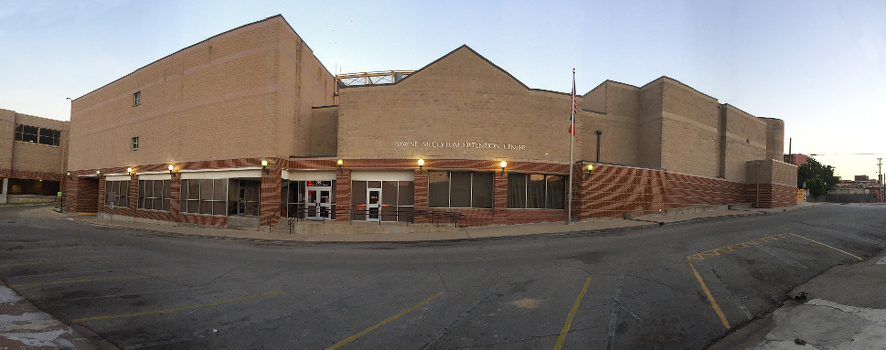About the Wayne McCollum Detention Center / Inmate Services
The Wayne McCollum Detention Center is named after Wayne McCollum who served as Sheriff of Ellis County for 20 years. The Detention Center has three phases. Phase 1 was opened in 1990 and is a podular design facility. Phase 2 was opened in 2002 and is a podular design facility. Phase 3 was opened in 2010 and is a direct supervision design facility. The facility has a maximum population of 856 prisoners.
Under the direct supervision philosophy, a detention officer is present inside the housing unit at all times to directly supervise and interact with the inmates. It is the responsibility of the detention officer to maintain control of the inmates' behavior, minimize negative conduct, and reduce or eliminate tension-causing situations. Officer security is maintained by radio communication and surveillance cameras. Paramount to the success of this style of supervision is the officer's complete authority and control over his or her area of responsibility. Each inmate spends most of his or her time inside the housing unit. The need for frequent and costly inmate movement is greatly reduced by providing most services within the housing unit. Direct supervision enhances the interaction between detention officers and inmates, reduces inmate violence and vandalism, and provides a significant cost savings by reducing the number of staff needed to operate the facility.
The Detention Division of the Sheriff's Office operates under the jurisdiction of the Sheriff.
Building Security
Security of the building, both inside and out, is provided via 24-hour a day monitoring conducted from a master control station. This station is equipped with state-of-the-art electronic monitoring systems for all access points, fire and smoke detection, and mechanical and emergency power systems. An additional control station is located at each housing area to directly monitor individual pod activities.
Inmate Processing
The processing area, sometimes called booking, is the inmate's first contact with the detention facility. It is here that the inmate is introduced to the direct supervision philosophy, as he or she will remain in an open waiting area, in lieu of being held in a secured cell, until the booking process is completed, or unless his or her behavior warrants traditional confinement. Measures have been implemented throughout the processing area to maximize coordination and efficiency of the intake area.
In the processing area are the property, bond, and release areas, which are accessible to the public to allow persons to post bonds, pay fines, or retrieve personal property for incarcerated inmates. All inmate property and financial accounts are maintained and all release transactions are conducted in these areas. The effectiveness of the direct supervision management philosophy relies strongly on accurate classification of the inmates. The classification process examines the inmate's criminal history and observes and evaluates his or her physical, mental, and social conditions and behaviors to determine the most appropriate housing unit assignment for that person.
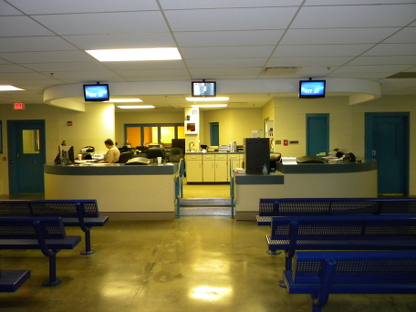
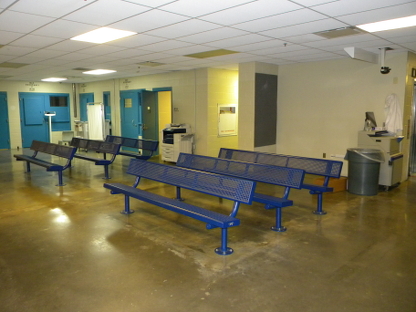
Medical / Mental Health / Dental
The facility is equipped to provide certain services to meet the basic health, nutrition, hygiene, and sanitation needs of the inmates. The design allows as many of these required services as possible to be delivered to the housing units to maximize security and minimize the need for staff intensive inmate movement and transportation costs. There is a medical exam area located in processing, and there are exam rooms located in the infirmary. Inmate medical care, basic clinical and dental services are provided in-house.

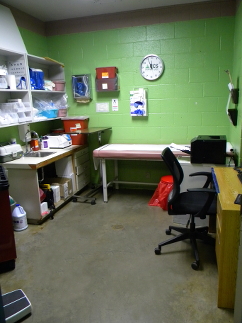
Meals / Laundry
The kitchen area was sized to accommodate up to 1,000 prisoners. Meals are prepared on site by inmate workers under the supervision of the kitchen staff, and then delivered to the housing units. The laundry service area contains commercial grade laundering and sewing equipment, and storage space for linens and inmate clothing. Other service areas include a commissary storage room.
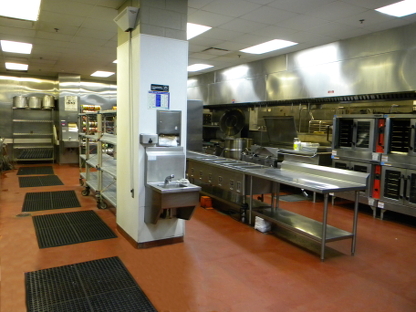
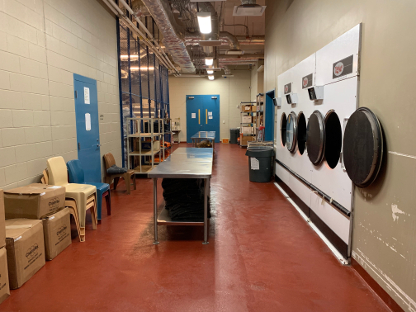
Self-Improvement & Education Opportunities
In keeping with its mission of system efficiency and fiscal responsibility, the facility includes space to provide self-improvement and educational opportunities in an effort to reduce the recidivism rate and comply with state regulations. Volunteers conduct a majority of the activities, which include courses, drug rehabilitation and counseling, religious and library services, visitation, and recreation. An inmate worker program is in place to facilitate completion of many tasks, such as preparation of inmate meals, trash collection and disposal, and general housekeeping. In addition, the Sheriff's alternative prisoner program (SAPP) utilizes inmate workers to preform maintenance like mowing county facilities while supervised by an armed detention officer. Availability of these programs serves as a management tool since inmate participation is contingent upon the display of positive, responsible behavior.
Commissary Services
Commissary is a mobile cart within the facility from which inmates may purchase products such as hygiene products, snacks, and a variety of other items. The Commissary cart is brought into each one of the dorm areas exluding Segregation units. Commissary is run seven days a week and the inmates receive their goods immediately after purchase. An example of the Commissary cart used is below.
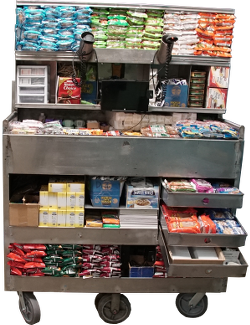
Chaplain - Inmates
The Ellis County Jail Chaplain has many responsibilities, but the main responsibility is to tend to the spiritual and emotional needs of the inmates. How Chaplains do that varies depending on the inmate population and the problems those particular inmates face. Jail Chaplains, then, must be flexible and ready to help inmates with a wide range of issues.
Many inmates rely on Jail Chaplains to discuss spiritual matters with them. They may have questions about how to reconcile their crimes with their spiritual beliefs. Chaplains may help inmates tackle their spiritual concerns by listening, giving advice and showing that they empathize with members of the inmate population. Chaplains work with detention staff so that inmates have time for daily prayer, if that is part of their faith, and may attend inmate religious services.

